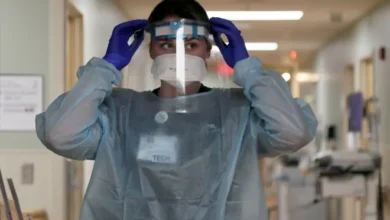In the US, emergency rooms refused to treat pregnant patients, forcing one of them to miscarry in a restroom in the lobby
When front desk officials at a Texas emergency hospital refused to accept a lady, the woman miscarried in the toilet lobby. The day after a security officer turned her away from a Florida hospital, another lady found out her baby had no heartbeat. When an ER in North Carolina was unable to provide an ultrasound, a lady gave birth in her vehicle. Later, the infant passed away.

Federal papers released by The Associated Press show that after the US Supreme Court repealed Roe v. Wade in 2022, complaints that pregnant women were turned away from emergency hospitals in the US increased.
These incidents cast doubt on the availability of emergency pregnancy care in the United States, particularly in places with strong abortion restrictions. They also raise questions regarding the scope of medical professionals’ scope of practice.
According to Oregonian OB/GYN Amelia Huntsberger, “it’s shocking, it’s incredibly shocking.” That someone would visit an emergency department and go untreated is horrifying; this is unthinkable.
Despite government regulations that the ladies get treatment, it has nevertheless occurred. According to federal law, emergency departments must treat or stabilize patients who are in labor or, in the event that they lack the personnel or resources to do so, arrange for a medical transfer to another hospital. If medical institutions take Medicare financing, they have legal obligations to uphold. On Wednesday, the Supreme Court will hear arguments that would make such safeguards less effective. Because Idaho prohibits abortions, even in cases of medical emergencies, the Biden administration has filed a lawsuit, claiming that this violates federal law.
The head of the White House Gender Policy Council, Jennifer Klein, said in a statement that no woman should be prevented from receiving the treatment she needs. All patients should have access to emergency medical treatment as mandated by the Emergency Medical Treatment and Labor Act, including pregnant women facing medical crises.
CARE OF PREGNANCY AFTER ROE
Sara Rosenbaum, a health law and policy expert at George Washington University, said that in states with severe prohibitions on abortion, pregnant people have become radioactive to emergency rooms. The emergency medical team won’t even look at a pregnant patient because they are so afraid of them. Rosenbaum said, “They simply want these people gone.” A week after the Supreme Court’s abortion decision in July 2022, a lady who was nine months pregnant and experiencing contractions showed up at the Falls Community Hospital in Marlin, Texas. She was sent away by the on-call physician. Interviews with hospital workers revealed to federal investigators that the doctor came to the triage desk and informed the patient that we did not have obstetric services or skills, according to the papers.
The doctor was told by the nursing staff that we may do an amniotic fluid test on her. The doctor, however, insisted that the patient drive himself to a hospital in Waco. The Centers for Medicare and Medicaid Services investigators came to the conclusion that Falls Community Hospital had broken the law. When contacted by phone, a hospital administrator refused to discuss the matter. The AP received hundreds of investigations from a February 2023 Freedom of Information Act request that requested any EMTALA complaints connected to pregnancy from the previous year. The federal government agreed to share a limited number of complaints and investigation papers submitted across just 19 states, a year after the request was made. The records were altered to remove the identities of the physicians, nurses, and patients.
In those states, federal agents probed just over a dozen pregnancy-related complaints in the months before the US Supreme Court’s landmark decision on abortion in 2022. However, in the months after the announcement of the judgment, over two dozen complaints about emergency pregnancy care were made. Since the records request only included complaints from 2022 and the information is not generally publicly accessible, it is unknown how many complaints were submitted in the previous year. What happened to the patient who was turned away from Falls Community Hospital was not included in the records. “SHE IS CREAMING A LOT.” The records indicate that other pregnancies resulted in disasters.
The front desk personnel at Sacred Heart Emergency Center in Houston declined to check in a lady whose husband had requested assistance with giving birth that September. As her husband dialed 911 for assistance, she miscarried in the emergency hospital lobby’s bathroom. The husband’s call, which was translated from Spanish in court filings, notified first responders that his wife was bleeding heavily and had miscarried. I’m in the hospital, but they told us that because we are not their clients, they are unable to assist us.
According to 911 call records, when emergency personnel came twenty minutes later and took the lady to a hospital, they were perplexed by the staff’s denial of assistance. Federal investigators were informed by one first responder that a staff member at Sacred Heart Emergency Center said, “No, we can’t tell you, she is not our patient,” in response to a question on the gestational age of the baby. It’s the reason you’re here.
Sacred Heart Emergency Center management refused to comment. The facility is not physically attached to a hospital since it has a Texas license as a standalone emergency room. According to a Texas Health and Human Services agency spokesperson who sent an email to the Associated Press, such institutions are required by state law to treat or stabilize patients. Publicly accessible archives of the center’s website state that Sacred Heart Emergency no longer takes Medicare, a move that was made at some point after the lady miscarried. A pregnant patient complaining of stomach discomfort was informed by the personnel at Person Memorial Hospital in Roxboro, North Carolina, that an ultrasound would not be possible for her. Federal authorities claim the personnel neglected to warn her about the dangers of leaving without being stabilized. The mom gave birth to a dead baby in her vehicle while traveling 45 minutes to another hospital. The event was self-reported by Person Memorial Hospital. According to a spokesman, the hospital keeps our personnel and providers up to date on education in order to guarantee compliance. Because the expectant mother had brought a kid with her, a security officer at Holmes Regional Medical Center in Melbourne, Florida, would not let her inside the triage area. No fetal heartbeat could be seen when the patient returned the next day. Regarding the matter, the center refused to comment. PENALTY: WHAT IS IT? If emergency rooms refuse patients, do not stabilize them, or send them to another hospital for care, they will be hit with heavy penalties. Medicare funding for hospitals may potentially be jeopardized by violations. However, it is unclear what penalties may be levied against over a dozen institutions that the Biden administration claims did not provide adequate care for expectant mothers in 2022. Fines in these situations may not be assessed for years. If the hospitals have been sent to the government’s Office of Inspector General for sanctions, the Health and Human Services agency, which upholds the law, refuses to disclose. Despite the state’s abortion restriction, Huntsberger felt protected to serve pregnant patients in Idaho because to the OB-GYN EMTALA program. Because of the restriction, she moved to Oregon to practice last year from Idaho.
Hospitals are discouraged from dumped patients by the prospect of penalties or losing Medicare reimbursement for breaking EMTALA, she added. If they lost their Medicare funds, many would not be able to continue operating. She has been waiting to see how the Department of Health and Human Services (HHS) will punish two hospitals in Missouri and Kansas that it said last year it was looking into after a pregnant lady who was 17 weeks along with preterm labor was refused an abortion. Many of these incidents go unreported, but even those that are, like the instances from the Midwest, are looked at, but Huntsberger said that nothing significant ever comes of them. Individuals will just continue to provide poor care or none at all. This kind of thing is the only way that things change. UPCOMING FOR EMTALA Both US Health Secretary Xavier Becerra and President Joe Biden have made a public commitment to upholding the legislation. The White House has maintained that hospitals receiving Medicare funding must provide stabilizing treatment, including abortions, even in areas where severe abortion restrictions have been passed.
Becerra referred to it as the country’s cornerstone statute defending Americans’ access to life- and health-saving emergency medical treatment in a statement to THE AP. Furthermore, professionals should decide what qualifies as emergency treatment, not politicians, he said. If a mother’s health is in danger, an abortion is prohibited by law in Idaho. The state’s attorney general, however, has maintained that the state’s abortion prohibition complies with federal law, which requires emergency rooms to provide care for unborn children in case of medical crises.
Idaho Attorney General Raul Labrador said earlier this year that the Biden administration “has no business rewriting federal law to override Idaho’s law and force doctors to perform abortions.” The Supreme Court will now comment. The decision may have ramifications for other states, such as Arizona, which is considering reintroducing an 1864 law outlawing abortions altogether, except in situations where the mother’s life is in danger. According to Alexa Kolbi-Molinas of the American Civil Liberties Union, EMTALA was first enacted decades ago in response to private hospitals sending their patients to county or public hospitals, often because the patients lacked insurance. Additionally, several hospitals refused to admit expectant patients if they had no established rapport with the staff doctors. According to her, more hospitals may decide to turn away patients without worrying about facing penalties from the federal government if the court strikes down or weakens such safeguards. Kolbi-Molinas says that the government is aware of the issue, is looking into it, and is taking action. They wouldn’t be able to do it without EMTALA.







